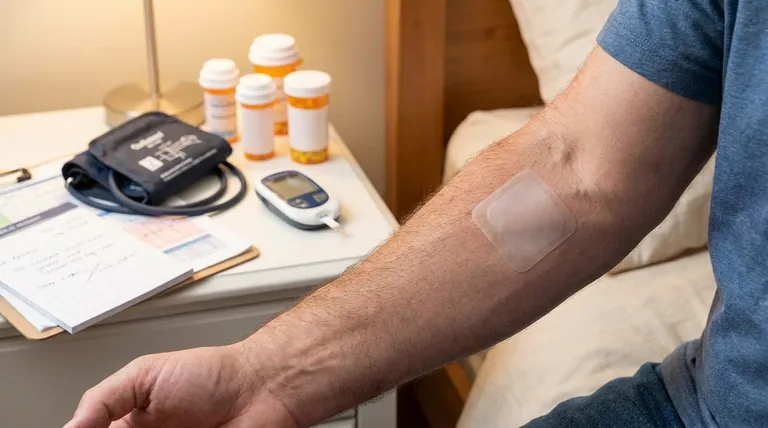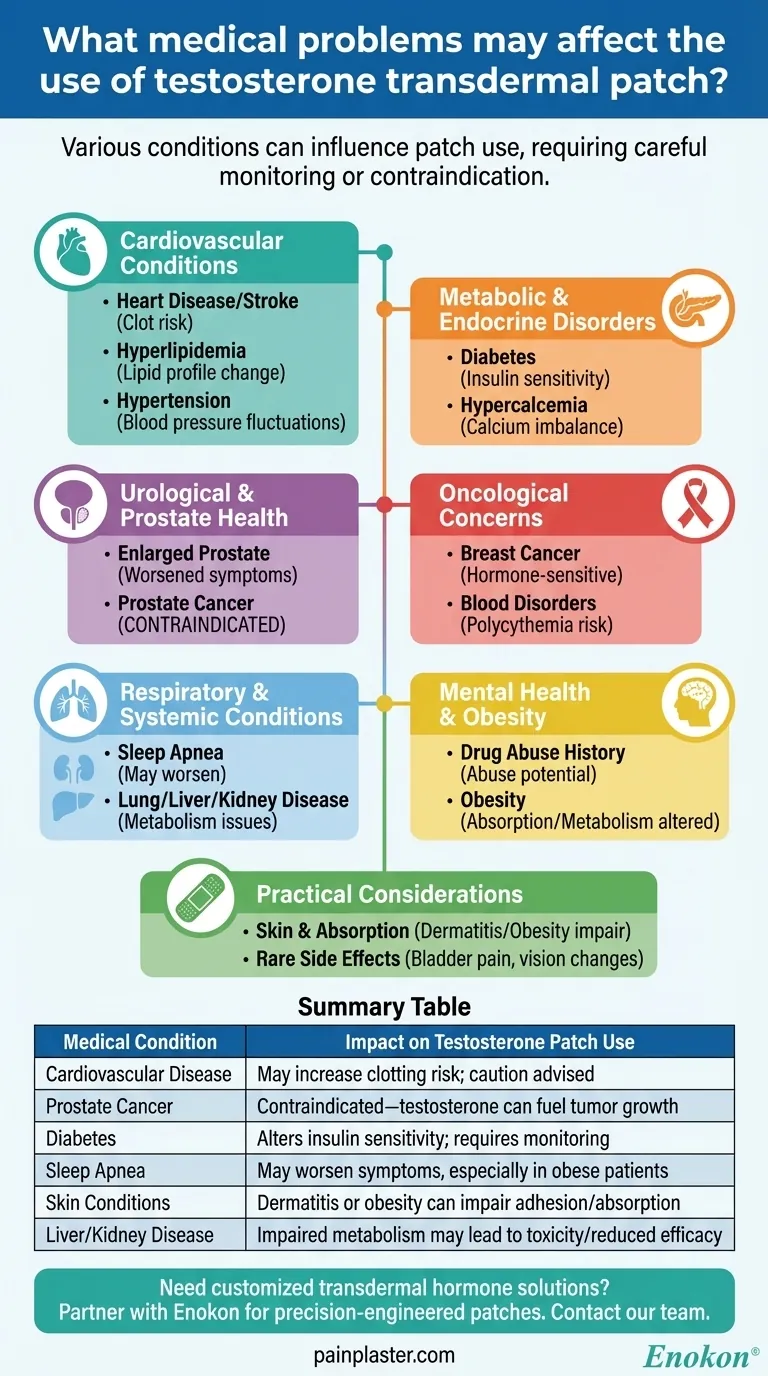The use of a Testosterone Transdermal Patch can be influenced by various medical conditions, which may either contraindicate its use or require careful monitoring. These conditions span cardiovascular, metabolic, urological, oncological, and systemic health issues. Understanding these factors is crucial for safe and effective hormone therapy, especially for individuals with pre-existing health concerns. Below, we explore the key medical problems that can impact the suitability and safety of testosterone transdermal patches.

Key Points Explained:
-
Cardiovascular Conditions
- Heart Disease/History of Heart Attack/Stroke: Testosterone can increase red blood cell production, raising the risk of blood clots, which may exacerbate cardiovascular issues. Patients with a history of heart disease or stroke should use caution.
- Hyperlipidemia: Testosterone may alter lipid profiles, potentially worsening cholesterol levels. Regular monitoring is advised.
- Hypertension: Hormonal fluctuations can affect blood pressure, necessitating close supervision.
-
Metabolic and Endocrine Disorders
- Diabetes: Testosterone can influence insulin sensitivity, requiring adjustments in diabetes management.
- Hypercalcemia: Hormone therapy may exacerbate calcium imbalances, particularly in patients with parathyroid disorders.
-
Urological and Prostate Health
- Enlarged Prostate/Urinary Problems: Testosterone can stimulate prostate growth, worsening symptoms like urinary retention or difficulty passing urine.
- Prostate Cancer: Testosterone is contraindicated in active or suspected prostate cancer due to its potential to fuel tumor growth.
-
Oncological Concerns
- Breast Cancer: Androgens may interact with hormone-sensitive cancers, making patches unsuitable for patients with a history of breast cancer.
- Blood Disorders: Conditions like polycythemia (excessive red blood cells) can be aggravated by testosterone’s erythropoietic effects.
-
Respiratory and Systemic Conditions
- Sleep Apnea: Testosterone may worsen obstructive sleep apnea, a condition often linked to obesity.
- Lung/Liver/Kidney Disease: Impaired organ function can alter testosterone metabolism, increasing the risk of toxicity or reduced efficacy.
-
Mental Health and Dependency
- Drug Abuse History: Testosterone has abuse potential, particularly in individuals with a history of substance dependence.
-
Obesity
- Adipose tissue can affect hormone absorption and metabolism, potentially altering patch efficacy.
Practical Considerations
- Skin and Absorption: Conditions like dermatitis or obesity may impair patch adhesion or absorption.
- Rare Side Effects: Bladder pain, vision changes, or testicular discomfort warrant immediate medical review.
For optimal outcomes, patients should disclose their full medical history to healthcare providers before starting therapy. Regular follow-ups are essential to monitor for adverse effects and adjust treatment as needed. Have you considered how comorbidities might interact with your hormone therapy plan? These patches, while convenient, require personalized management to balance benefits and risks.
Summary Table:
| Medical Condition | Impact on Testosterone Patch Use |
|---|---|
| Cardiovascular Disease | May increase clotting risk; caution advised for heart attack/stroke history. |
| Prostate Cancer | Contraindicated—testosterone can fuel tumor growth. |
| Diabetes | Alters insulin sensitivity; requires monitoring. |
| Sleep Apnea | May worsen symptoms, especially in obese patients. |
| Skin Conditions | Dermatitis or obesity can impair patch adhesion/absorption. |
| Liver/Kidney Disease | Impaired metabolism may lead to toxicity or reduced efficacy. |
Need customized transdermal hormone solutions? Partner with Enokon, a trusted bulk manufacturer of precision-engineered transdermal patches and pain plasters for healthcare brands and distributors. Our expertise in R&D ensures safe, effective formulations tailored to your patients' needs—especially those with complex medical histories. Contact our team to discuss compliant, high-quality hormone therapy products.
Visual Guide

Related Products
- Prostate Pain Kidney Health Care Patch for Men
- Far Infrared Heat Pain Relief Patches Transdermal Patches
- Medical Cooling Gel Patches for Fever Cooling Patches
- Menthol Gel Pain Relief Patch
- Icy Hot Menthol Medicine Pain Relief Patch
People Also Ask
- What should patients tell their doctor before using testosterone patches? A Guide to Safe Treatment
- What should be done in case of a testosterone patch overdose? A Step-by-Step Emergency Guide
- What should be done if a testosterone patch falls off? A Guide to Maintaining Hormone Stability
- What lifestyle factors should be considered when choosing between testosterone patches and injections? Find Your Best Fit
- What precautions should be taken when applying testosterone patches? Maximize Safety and Effectiveness














